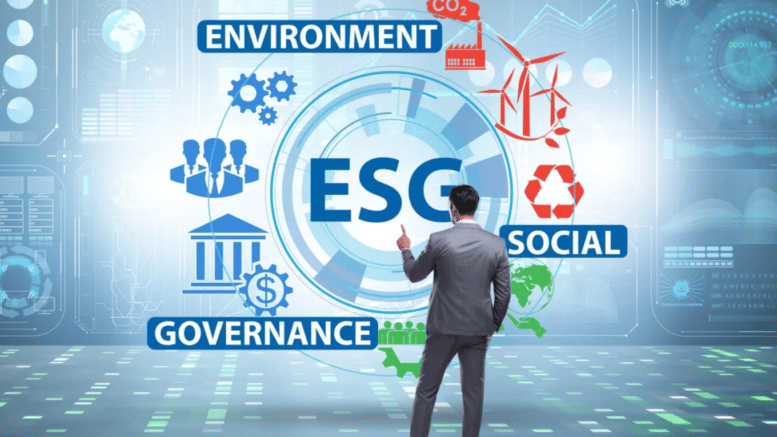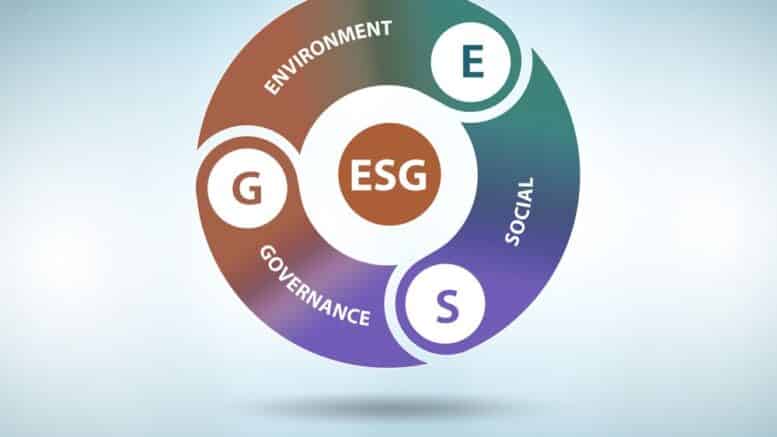The Roots Of ESG And How To Get Rid Of It

At this point, everyone knows about ESG, and everyone knows that companies and firms that embrace it are intent on pushing an environmental, social, and governance agenda, mostly on America. But the full story is very interesting and extremely disturbing.
Recently, I had the chance to hear Vivek Ramaswamy, the founder of Strive Asset Management, speak about ESG, how it came to be, how it functions, and how to combat it.
Ramaswamy said that the problems of ESG are not state or even national economic ones. They make up a transnational, trans-partisan battle for the heart and soul of democracy itself. It is not Democrats versus Republicans, Left versus Right, black versus white, or gay versus straight. Rather, the real issue at stake is democratic-republican self-governance versus monarchy. Ramaswamy said that it is not a 2022 question but a 1776 question. ESG, says Ramaswamy, is a secular religion that started when ideas such as identity and the ability to achieve in life based on race, gender, or sexual orientation rose to the fore.
According to Ramaswamy, there were two toxic ideologies of the 20th century—the first being German Nazism, and the second Soviet-style Marxism. Blend the identity politics of the first with the oppressor-oppressed philosophy of the second and you have planted the seeds of ESG. This, in turn, allows for the application of labels to those who question the new cultural norm. Those labels include, but of course are not limited to, “racist,” “misogynist,” “climate-denier,” and “bigot.” Once those labels are applied, all debate is silenced.
The current problem, said Ramaswamy, began with the 2008 financial crisis. Ramaswamy was working for a Wall Street investment firm. He said anger began to rise when banks received financial bailouts, causing people to begin to question modern American capitalism. It also served as a nursery of sorts to the Occupy Wall Street movement. This movement, running on the fumes of the old progressive ideology, demanded that money be taken from the rich and given to the poor. But the neo-progressive movement was just starting to come into its own, and this movement postulated that the real problem was not poverty or economic injustice but rather racial injustice, bigotry, misogyny, and climate change.
Ramaswamy said that Wall Street saw a way to get off the hot seat. Corporations realized that they could get activists off their backs by doing things such as putting token minorities on corporate boards and championing the combatting of climate change and its supposedly racist impact. But the corporations said that the price would be for the Left to conveniently look the other way with regards to corporate power. In addition to being left alone, these companies also expected that the movers and shakers in government and these movements would give them certain business advantages. Ramaswamy cited a move by Goldman-Sachs in which it said it would not take a company public if it did not have a sufficiently diverse board. Ramaswamy called it a cynical grand bargain or even an arranged marriage between two sides that didn’t even so much as like one another. Ramaswamy likened it to “mutual prostitution,” which resulted in the “Woke ESG Industrial Complex.” This is a far more powerful entity than Big Business or Big Government, which allowed both elements to accomplish together what they could not do on their own.
This created the chance for new asset management companies to ride in on their proverbial white horses in the wake of the ’08 financial crisis. These included companies like BlackRock, State Street, and Vanguard, which would create “better capitalism.” According to Ramaswamy, these three companies, over 15 years, have acquired enough assets to manage more than $21 trillion of investment funds. This money is then used to advance a progressive agenda that would have never survived a legislative session.
Seeing Wall Street’s success, Ramaswamy said that Silicon Valley realized that it would also like a piece of the action. Even back in 2008, the tech lords knew that it was the Left that posed a threat to their burgeoning monopoly on at least a philosophical level. So the tech lords said they would use their corporate power to advance progressivism, doing things like censoring opinions and eliminating “hate speech,” as the Left defined it. In return, the Left would conveniently ignore the tech monopoly.
Seeing how well things worked out for Wall Street and Silicon Valley, much of corporate America would follow suit. Ramaswamy cited Coca-Cola speaking out against Georgia’s voting laws and forcing its employees to take diversity training, including courses on how to be “less white.” At the same time, Coke could ignore its product’s effects on American obesity. Nike could condemn “systemic racism” in America, while people overseas toiled in sweatshops for slave wages and, as Ramaswamy asserted, in conditions of slave labor to make high-end sneakers for sale in the U.S., often to people who might not be able to afford coats for their children.
Even though the two sides still loathe one another, the system, which is the merger of state and corporate power, stays in place because it continues to work so well. Ramaswamy called it the most powerful force in modern American life. Ironically, liberals allowed themselves to forget about their skepticism of big business, and it duped conservatives because the system was presented in the context of the free market. Ramaswamy said that he knows principled people on the left and the right who are deeply concerned about the issue, in part because free speech and open debate in the public square, where all voices and votes count equally, is being neutralized.
That is the “S” or social prong of ESG. Far more sinister, said Ramaswamy, is the “E” prong, or energy. Climate change has been used to envelop the social prong and make it a Trojan horse. The major asset management firms and banks have served as an arm of the government to implement climate change policies, such as the Green New Deal, which could not have passed Congress. Democrats realized that the private sector could be used to that end. Climate Czar John Kerry was able to get companies across the nation to sign a “climate pledge” to put the Green New Deal into effect without any debate or vote in the legislative branch. Ramaswamy said that the tactic has not only contributed to a generational supply/demand imbalance for global energy, but it also hasn’t even been effective. This is because we are in a global energy market, and countries like China and Russia snap up every unit of energy that ESG takes out of play in the West. So, according to Ramaswamy, on the other side of the world, carbon emissions continue unabated. On top of that, Russian and Chinese energy production is much dirtier than it is in the U.S. Methane produced by those countries is far worse than in the U.S.
Source: technocracy.news

